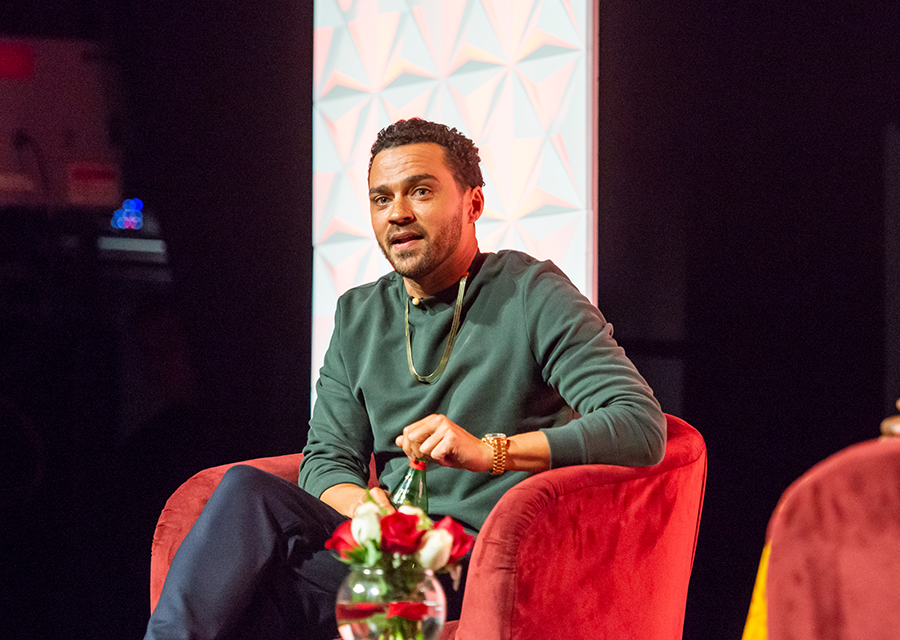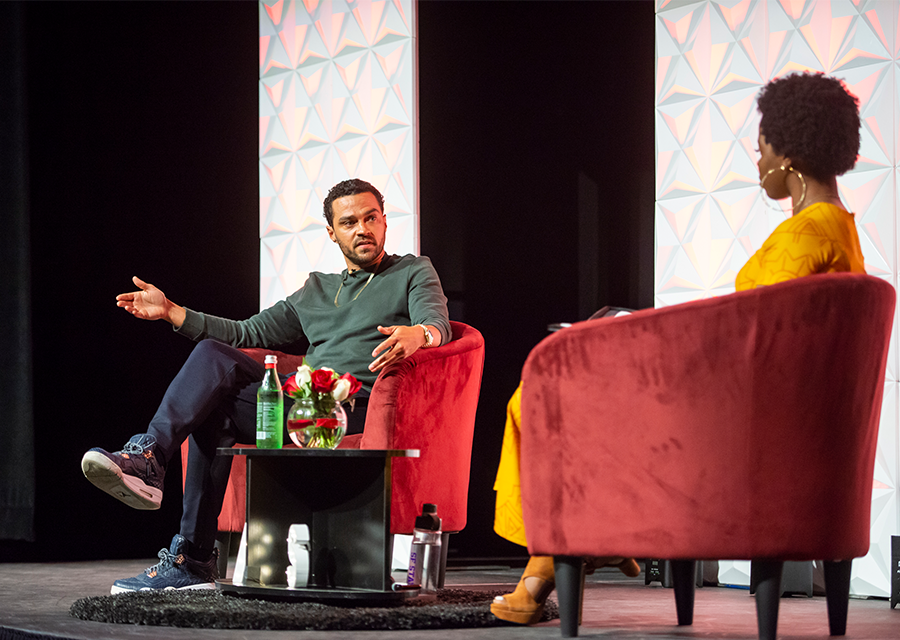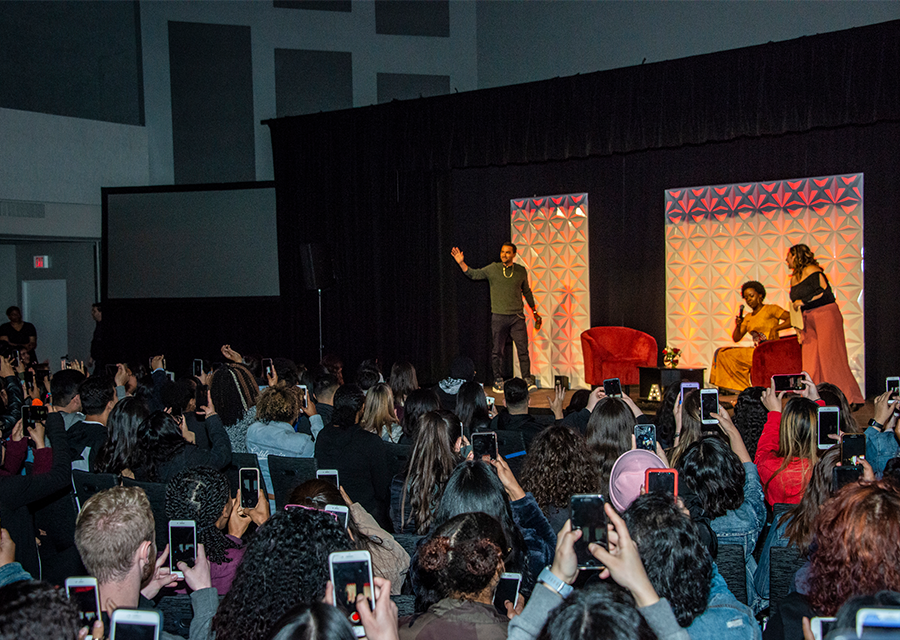‘Grey’s Anatomy’ star Jesse Williams Shares His Passion for Acting and Activism at AS Big Lecture
With 800 rapt listeners hanging on his every word, actor Jesse Williams, best known for playing Dr. Jackson Avery on “Grey’s Anatomy,” demonstrated exactly how he has used his celebrity platform to address tough topics that the public may not want to hear.
When he received the Black Entertainment Television (BET) Humanitarian Award in 2016 for championing civil rights, Williams gave an acceptance speech that went viral. Broadcast on live TV, Williams spoke about the enduring racism and violence in the United States, and the ways members of society can mobilize to change it. It was a speech that showed the world he was much more than the famous face they recognized on the small screen.
“[The BET acceptance speech] was an opportunity to speak to the larger America,” said Williams, “and the America I know doesn’t always want to know what’s up.”
On March 7, Associated Students of California State University, Northridge invited Williams to deliver the annual Big Lecture, held at the Northridge Center at the University Student Union. Williams spoke to the CSUN community about how he uses his voice to raise social issues, such as racism and human rights violations, and to advocate for education, diversity and inclusion.
In his acting career, Williams has starred in films such as “Lee Daniels’ The Butler,” “The Sisterhood of the Traveling Pants 2,” “The Cabin in the Woods” and independent Sundance film “Band Aid.” He is also known to the video game world as the rebellious android Markus from the PlayStation 4 game “Detroit: Become Human.” Most notably, however, he is in his ninth season starring as Avery in ABC’s hit series “Grey’s Anatomy.”
The medical drama premiered its 15th season this past fall to about 7 million viewers. However, many Americans are unaware of the show’s immense social impact, Williams said.
He shared that he received numerous letters from “Grey’s Anatomy” fans applauding the show for raising visibility of women, people of color and LGBT people as doctors and surgeons.
“They see us. We’re real,” he said. “People just want to be included.”
Before this big break and landing a role in the series in 2009, Williams worked as a high school teacher in Philadelphia public schools. In his CSUN lecture, he referenced his teaching life and talked about the importance of showing people their options and paths to achieve success.
“It is our jobs as educators and educated people to expand the bouquet of what is attainable,” he said. “In the media, we do that through representation.”
“Grey’s Anatomy” puts representation at its core and features diverse individuals in medical careers and succeeding professionally, a rarity in the industry, Williams said.
“Show business has always said, ‘It’s not that we want to exclude you black, brown, LGBT people; it’s just not profitable,’” he said. But reminding the audience that the series draws millions of viewers, he said of the industry, “You all said nobody wanted to watch it, and you’ve been proven wrong.”
Much more of his activism happens when the cameras are turned off and the lab coat is put away.
Williams serves on the board of directors for Advancement Project, a prominent multi-level civil rights organization committed to social change and inclusion in the United States, and for Sanfoka.org, an activist organization founded by American singer Harry Belafonte that ties music and performance to social justice.
Using the media to spread important messages, Williams’ activist efforts also include participation in a number of film, TV and media projects.
He was the executive producer of the documentary “Stay Woke: The Black Lives Matter Movement” and the trans-media art installation “Question Bridge: Black Males,” which features conversations with black men from different cultures and backgrounds. The trans-media storytelling is done through a documentary-style video, interactive website and mobile app. He is also one of the senior producers of the EPIX docuseries “America: Divided.”
Williams has harnessed technology to embrace culture and advocate for higher education, specifically through the smartphone apps Ebroji and Scholly.
Ebroji, a curated GIF keyboard featuring words and phrases from African-American slang, and images and symbols featuring black people and features, is a tool to give black people a way to communicate the way they organically talk, Williams said. Co-founding the app with his wife, Aryn Drake-Lee, Williams said he wanted Ebroji to celebrate an underappreciated culture.
“Black and brown culture make American culture,” Williams said. “Black and brown culture is a factory for being cool. But society ghettoizes it, so that you can be embarrassed about it.” Social media outlets like Ebroji can help diverse youth own their cultures and express it freely, he said.
As chief brand ambassador and board member of Scholly, an app that helps students find scholarships and grants tailored to their skills, majors and other qualifications, Williams said the app was a way to help students — especially underprivileged students — focus on reaching and living their dreams without the stress of financial burdens. He also said Scholly is dedicated to doing its part to wipe out student debt.
During the Q&A that followed his lecture, many students asked Williams about the hardships he’d faced on his way to stardom, and his advice for anyone trying to break into the entertainment industry.
On working in entertainment, Williams said, “This ain’t about being the best. There’s so much luck and circumstance involved.
“But what can you do to set yourself apart? You’ve got to outwork people,” he said. “When I was broke in New York, I went to every free class, workshop, seminar — I was active. If you don’t use your muscles, they will atrophy.”
People of color in the industry face particular challenges, he said. At the start of Williams’ career, he accepted parts as a thug or a criminal — a bitter, but necessary pill to swallow because there were hardly any other options and he needed to pay his rent, he said. As a biracial man born to an African-American father and a Swedish mother, he added, “You have to be so much better and work so much harder.”
Among all the raised hands in the audience, one belonged to a 10-year-old boy sitting in the balcony. Too shy to speak directly into the mic, a member of AS Productions spoke on behalf of the young attendee, asking Williams for advice about elementary-school struggles with academics and social life.
“Get better at what you’re doing,” Williams responded. “Make and create and find communities that are interested in the things you’re interested in. Nobody remembers who was the best guy or best girl in fifth grade. There’s so much more life ahead. Be patient with yourself. Be kind to yourself. Perfect is not interesting.”
To CSUN students, Williams emphasized the importance of making the most out of the educational opportunity they have.
“Whatever you’re doing, be great at it,” he said. “You’re already there [in class]. You might as well get an A. … It’s about learning. Go and fill your tank.”
As the event wrapped up, audience members streamed out of the Northridge Center. Several noted they left with much more insight about what Williams does behind the scenes.
Among those fans was Natalie Dahan, a senior majoring in biology and minoring in Africana studies, who said she aspires to become a surgeon — much like Williams’ on-screen persona.
Besides being a fan, Dahan said, she was motivated to attend the event with her professor, Aimee Glocke, associate professor of Africana studies.
Glocke, who obtained her Ph.D. at Temple University — where Williams studied film and media arts and African-American studies — offered extra credit to her students for attending his Big Lecture.
“My students often ask, ‘What can you do with an Africana studies degree?’” said Glocke. Nodding her head at the stage and at Williams, she said, “Well, something like that.”




 experience
experience